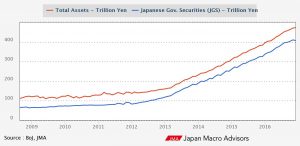 “Let me tell you a story to chill the bones About a thing That I saw ” Janick Gers Steve Harris
“Let me tell you a story to chill the bones About a thing That I saw ” Janick Gers Steve Harris
Japan has just published its budget and is on its way to another year of pauper growth and high debt. The estimates of the Government and the Bank of Japan appear, again, overly optimistic.
Japan should matter to all of us. Because it is an example of what we should not do in the rest of the world, after two decades of stagnation and repeating stimulus after stimulus.
The Economist places Japan again among the 20 economies with lowest growth for 2017, and estimates 0.5% GDP growth per year between 2017 and 2021.
This budget is yet another example of Abenomics as a total failure. The plan launched by PM Shenzo Abe to boost growth and fight deflation has delivered, as expected, the poorest results imaginable.
The first problem of the budget is the enormous debt. Revenues cover about 60% of the expenses in the budget. The rest will be financed by issuing more debt, which already exceeds 229% of GDP. Neo-Keynesians who repeat that we should not care “because rates are low” ignore that almost 20% of the budget goes to interest payments even though Japan´s cost of debt is very low (today the 10-year bond is c0.10 %). However, it is dangerous to ignore that the Bank of Japan will “eat” the vast majority of those bonds , and now accumulates more than 35% of the bonds issued by the Government as well as owning the largest share of ETFs in the country. The central bank of Japan is on the path to being the largest shareholder of 55 companies in the Nikkei by end of 2017 and is already one of the top five shareholders in 81 . Seriously, this is as close to a pyramid scheme as one can imagine.
The published budget shows the demographic time bomb facing the country, one that Europe should learn … A rapidly aging population is not solved by monetary laughing gas. More than 40% of the budget goes to pensions and health care.
But above all, monetary policy and government stimulus does not guarantee pensions, which will be cut again in 2017-2018 due to the unsustainability of the system. This should be yet another warning sign to those who say pensions are guaranteed by raising taxes and monetary policy. It does not even happen in Japan.
Of course Japan has a low unemployment, but it has always been that way. And the combination of an ageing population and cultural challenges for immigration keep the work force tight. However, Social Security contributions fail to cover even a portion of the expenditure in public pensions. Additionally, at 36%, Japan has one of the lowest replacement rates in the world (the percentage of the last salary paid as public pension).
And that is the big problem, we try to solve with monetary measures the impact of much more relevant trends, such as demographics. Increasing taxes and disguising the problem, introducing massive useless stimulus plans only postpones the inevitable.
Some might say “who cares” because there is no inflation. However, real wages in Japan are at a two-decade low and disposable income continues to erode . The only real beneficiary of Japan’s monetary mirage – which is a slow robbery of the saver under the false pretence of the “social contract” – is the Government, which keeps increasing debt without addressing structural reforms, and the challenges of productivity and “special interests”.
We should see Japan as a warning sign, because in the EU we are copying the same mistakes but without Japan´s labour discipline and technology.
@dlacalle_IA
Daniel Lacalle is PhD in Economics and author of “Life In The Financial Markets” and “The Energy World Is Flat” (Wiley)
Chart courtesy Japan Macro Advisors
Article published in Spanish in El Español
